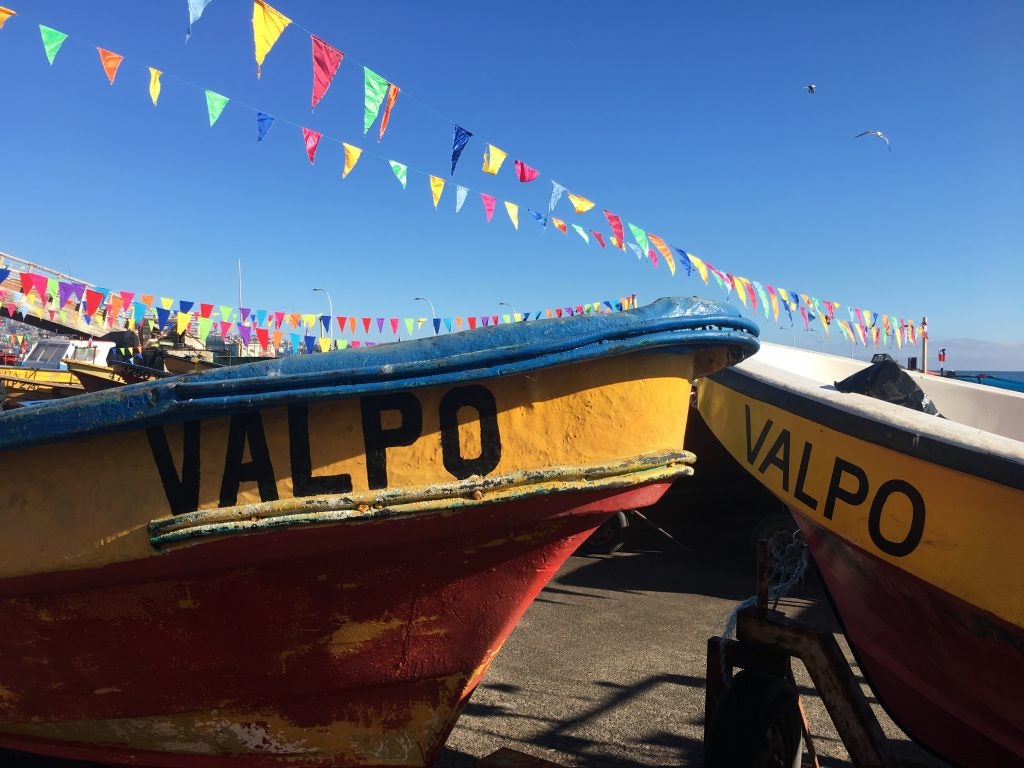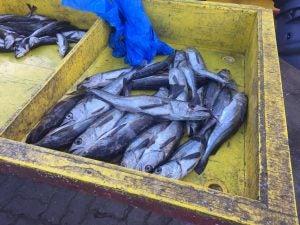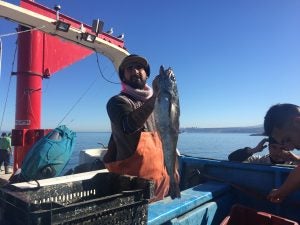 By Sergio Palma and Dovilė Meliauskaitė
By Sergio Palma and Dovilė Meliauskaitė
The COVID-19 crisis highlights the urgency of transforming global and local seafood supply chains. These supply chains need to be not only sustainable, but also transparent, hygienic and valuable for local coastal communities. In Chile, EDF is working with partners to design an innovative solution to this issue, one where fisher organizations will be more empowered and will receive fairer prices for their fish — while the government will be better equipped to manage the fisheries. This solution centers around certifying fisher organizations to ensure that fishing is legal, well-reported and stays under catch limits, eventually rebuilding fish stocks. Certified seafood will in turn prompt the creation of a new network of regional wholesale markets that will modernize and lead to a more secure seafood supply chain in Chile.
Why a different type of certification is needed
Chile has traditionally relied on an export-oriented economic model. Now with the COVID-19 crisis, which has shut down many export markets in Chile, the country is facing a new reality that requires Chile to be more self-sufficient — by developing domestic supply chains and enhancing the availability of seafood to feed the Chilean people. In addition, Chile represents almost 2% of global catch, emphasizing the urgency to tackle some of its major problems like under-reported fishing, poor sanitation and inefficient supply chains.
 One of the country’s most culturally important species — Chilean hake — has been overexploited since 2014. Although Chilean hake is predominantly sold domestically, it doesn’t provide enough economic security for many coastal communities to depend on. According to a World Wildlife Fund study, the artisanal fleet overfishes their quota allocations by up to four times. Moreover, artisanal fishers are vulnerable to the local supply chains, which are riddled with inefficiencies and lose value through many intermediaries. For these reasons, working to certify and improve the hake fishery is necessary.
One of the country’s most culturally important species — Chilean hake — has been overexploited since 2014. Although Chilean hake is predominantly sold domestically, it doesn’t provide enough economic security for many coastal communities to depend on. According to a World Wildlife Fund study, the artisanal fleet overfishes their quota allocations by up to four times. Moreover, artisanal fishers are vulnerable to the local supply chains, which are riddled with inefficiencies and lose value through many intermediaries. For these reasons, working to certify and improve the hake fishery is necessary.
Certifying Chilean caletas: an innovative solution for improved local economies and clean fish
In Chile, artisanal fishers are organized into “caletas,” membership-based fishing organizations formed on the basis of geography and species harvested. The caleta is the most important economic unit for sustainability goals.
Fishers’ responsibilities as caleta members include landing at specific ports, complying with internal regulations and paying dues in exchange for various socioeconomic benefits. As such, EDF decided to leverage the caleta system and align incentives for sustainable fishing behavior. Certifying a caleta would mean all its members, as a collective, must follow stricter fishing, handling and reporting protocols in order to receive premium fees generated through the sale of certified, traceable seafood. This seafood would be sold in a newly established network of clean, sustainable, regional marketplaces for wholesale distribution. World-famous certification schemes such as the Fair Trade USA capture fisheries standard and the Marine Stewardship Council certification are oriented mainly at export markets; this certification would be tailored specifically to the domestic market in Chile.
As such, only certified caletas would be eligible to sell to this new network of wholesale markets throughout Chile, which can be constructed to be a sustainable alternative to the only fishing terminal available in Santiago. These new markets will offer consumers sustainable high-quality, clean fish, and fishers will be rewarded with premium pricing. These regional wholesale markets will be built to utilize the Chilean national fisheries service’s traceability technology and meet improved hygienic standards, which is particularly relevant not only as a marketing opportunity, but also as a COVID-19 response. Therefore, if certified, these caletas would ensure benefits are permanently put into practice.
Designing a certification program
As EDF embarks on the design of this certification system, we have garnered the support of Chile’s fishing authorities, such as the National Fisheries Service (Sernapesca), Undersecretariat of Fisheries (Subpesca), Chilean Agency for Food Health and Safety (Achipia) and various artisanal fisher associations. Together with our partners, we have determined that a number of environmental, economic and social considerations are critical. Regarding environmental sustainability, the certification aims to reduce IUU fishing by creating incentives for fishers to act as stewards of their ocean resources and to comply with legal landings, quotas, catch limits, size limits, gear restrictions and temporal closures. In addition, improved traceability from dock to marketplace will enable better management and contribute to rebuilding of fish stocks, starting with Chilean hake.

In terms of economic benefits, key considerations in the certification design are: ensuring fishers receive better prices for fish, providing access to shorter supply chains and improving the livelihoods of coastal communities through eligibility for ownership shares in regional wholesale markets. What’s more, the different wholesale buyers in Chile will be able to secure a more reliable supply of premium quality fish at a competitive price.
There are many social issues that certification would improve. One of the most important outcomes is improved hygiene, as consumers are looking for reassurance that they can buy clean fish handled in a sanitary manner. Moreover, certification should generate trust throughout the supply chain: fishers, producers, consumer and enforcement authorities will enjoy greater transparency, which will improve information along the decision-making and value-chain lines. Additionally, as fishers become better stewards and engage in co-management of ocean resources, the relationship between the authorities and the fishing communities is expected to improve. Furthermore, over time and with sufficient capacity building, certification should empower the caletas to maintain sustainable small-business models. Finally, an important cultural benefit is the preservation of fish as traditional food and fishing as a traditional occupation.
EDF’s Sergio Palma emphasizes the goal of this project. “While the certification and wholesale market solution is being designed with Chilean hake in mind, this species will serve as a model and a pilot case for other species,” he says. “We are on the right path of doing ecosystem work, rather than focusing only on specific fisheries.”
The expected benefits
EDF and our partners expect this certification to benefit Chilean stakeholders in three ways. First, from a biological perspective, this initiative will help rebuild the Chilean hake stock to its maximum sustainable yield, thus helping achieve Chile’s fishery management goals. Second, economically speaking, more quality Chilean-caught seafood will be sold domestically in the wholesale and hospitality sector as a result of the certification, in turn improving livelihoods in coastal communities. Third, this initiative will have positive social impacts and improve conditions for hake fishers by granting them more agency.
EDF Humboldt Current director Erica Cunningham summarizes it well. “Artisanal fishermen organized into caletas will become price setters instead of price takers. The new wholesale marketplace will be created to support them — instead of exploit them.”









